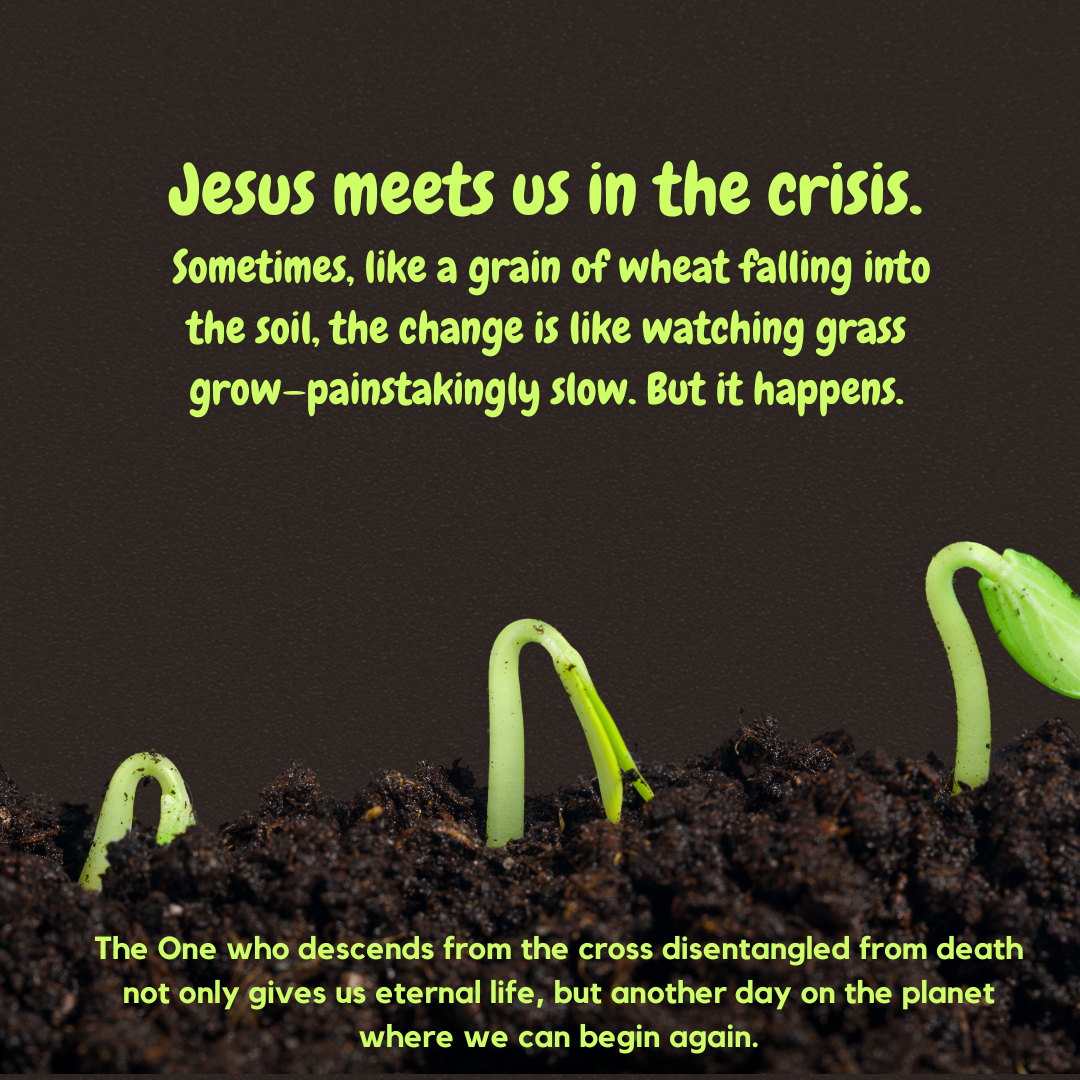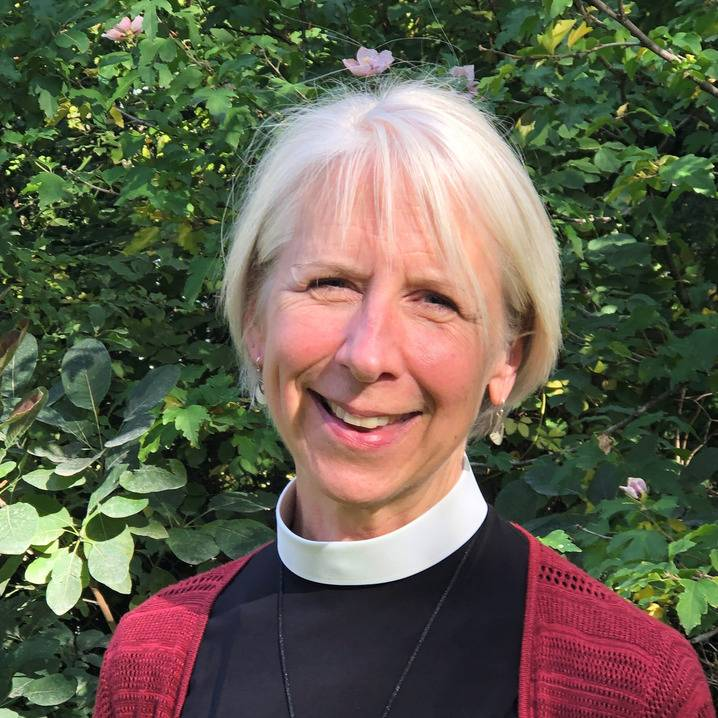Co-missioners,
The Rev. Lori Cornell surprised us late last week with a submission for Thursday Theology. We can’t help but share it with you today, our first chance for doing so. That the work is pegged to the Gospel text for the Sunday after next is the lesser reason for the rush. The greater is to spread the joy of having heard from her.
Lori has been a key leader at Crossings for almost twenty-five years, serving primarily as the editor of our weekly text studies. Last fall, a sudden eruption of cancer forced her to step aside from this for a while. She also took a leave of absence from her duties as lead pastor at St. Mark’s Lutheran Church, Spokane, Washington. We’d guess that any number of you who are reading this have been praying for her these past few months.
Against this background comes today’s startling gift. A sermon, Lori calls it. We think it’s also a model of how to put the Crossings text study method to the use it’s designed for: to identify a problem at its deepest and then to irradiate it with Christ and his benefits. “Targeted therapy,” to borrow a term Lori will use. You’re sure to find yourself thanking God for the therapy delivered through Lori today.
Peace and Joy,
The Crossings Community
______________________________________________________________________
A Better Life
Sermon for the Fifth Sunday in Lent, 2024
Text: John 12:20-33
by Lori A. Cornell
+ + +
John 12:20-33—
20Now among those who went up to worship at the festival were some Greeks. 21They came to Philip, who was from Bethsaida in Galilee, and said to him, “Sir, we wish to see Jesus.” 22Philip went and told Andrew; then Andrew and Philip went and told Jesus. 23Jesus answered them, “The hour has come for the Son of Man to be glorified. 24Very truly, I tell you, unless a grain of wheat falls into the earth and dies, it remains just a single grain; but if it dies, it bears much fruit. 25Those who love their life lose it, and those who hate their life in this world will keep it for eternal life. 26Whoever serves me must follow me, and where I am, there will my servant be also. Whoever serves me, the Father will honor.
27“Now my soul is troubled. And what should I say—‘Father, save me from this hour’? No, it is for this reason that I have come to this hour. 28Father, glorify your name.” Then a voice came from heaven, “I have glorified it, and I will glorify it again.” 29The crowd standing there heard it and said that it was thunder. Others said, “An angel has spoken to him.” 30Jesus answered, “This voice has come for your sake, not for mine. 31Now is the judgment of this world; now the ruler of this world will be driven out. 32And I, when I am lifted up from the earth, will draw all people to myself.” 33He said this to indicate the kind of death he was to die.
+ + +
I have no congregation to preach to today. I am on medical leave from my beloved congregation, watching my hair come back slowly—six months after radiation on my brain. It’s kind of like watching grass grow. Slow.
I have loved my life. And I have lost it. All the plans I had mapped out have evaporated: serve one last congregation, enjoy a sabbatical, then retire and travel. My only vocation now? Watching my hair grow back, reading like I haven’t in years, taking my meds, working out, and finding a new show to binge on streaming.
That pales in comparison to what Jesus is called to: Dying. “Very truly, I tell you, unless a grain of wheat falls into the earth and dies, it remains just a single grain; but if it dies, it bears much fruit.” His description sounds so natural, unlike his crucifixion.
And then, much to my chagrin, Jesus suggests to his followers that this process of dying and rising becomes incarnate in us: “Those who love their life lose it, and those who hate their life in this world will keep it for eternal life.” Well, that sounds pretty dire. We want to serve our own purposes, pursuing untroubled lives. Jesus seems to insist that this dying and rising is for us to undergo too.
Somehow, while we are hanging on the promise that Jesus died for our sins, we failed to account for the full gravity of that gift. Jesus connects his vocation and ours—to die that we might live.
But we human beings fight death. We do everything to stay alive. Seeking the fountain of youth at Sephora. Working harder at the gym. Defying the gravity of age by consulting doctors who can nip and tuck. Dying is just an end. So, we avoid dying however we can. Targeted therapy is my current weapon against death (it’s like a heat-seeking missile for cancer). One pill a day to keep me upright.
But, while we try to preserve our lives, another kind of pall hovers over us: a spiritual living death. This is not just living without meaning or purpose. But living as if “I am all that matters.” My actions may affect others adversely, but it’s more important that I be right or better-than or first in line. Injustice and inequity may riddle the world, but I’ve gotta be me. No self-reflection, no concern for scruples. We pursue untroubled lives—not giving a whit about our souls, let alone what Jesus has done for us.
And then death comes crashing down on us: we lose a child, our career tanks in a hostile business takeover, or the dreaded diagnosis is confirmed by a second doctor, and we are laid bare. This living-for-ourselves has left us without the resources we need. We appeal to an angry god who gave us no options—who conceived this calamity. Or we cry out to a god who might offer mercy, we think, but we’re met with silence. And given the gods we’ve been calling on, there is no answer.
Meanwhile the Grain of Wheat that has fallen into the soil and dies, sees us—the undead—grappling instead for a piece of any god we can lay hold of.
Salvador Dali’s looming portrait, Christ of Saint John of the Cross, depicts a Christ who has been crucified. But his hands are unbound, he dons no crown of thorns, and he no longer bleeds. He is the crucified One, hovering over his disciples—disciples who have denied his death, or who think that his death is only good for one thing: their own resurrection.
Yet Dali’s Christ has hands and feet that have been loosed to intrude into the lives of doubters and deniers. His head, leaning into the world, creates a circle reaching down into our unknown griefs. We followers, who have laid a plan for how Jesus’ and our lives should go, are unsettled. We rebuff his intrusion; we want only his acquiescence. Let me be cancer free, we say. Allow my child to live. Give me back my work.
But Christ does not meet us in the past. He meets us in the here-and-now, coming to us in the crushing change. Jesus meets us in the crisis. Sometimes, like a grain of wheat falling into the soil, the change is like watching grass grow—painstakingly slow. But it happens.
I typeset and wrote for the Christian Century Magazine in the late 1980s, immersing myself in the personal testimonies that would sometimes appear there. An article from that era that changed my mind toward my diagnosis of lung cancer was entitled, “Why Not Me?” The author had lost his wife and daughter in a life-taking collision, leaving him alone with his son. Surprisingly, the author took on the “why me” theology that is our go-to in suffering. He asked, “Why not me?” and laid to rest the theology of an ever-angry god. Instead, believing in a gracious and merciful God in Christ, he resisted the suggestion that he should put God on trial, and asked, Why should I expect that I am immune to adversity any more than the next person? Christ came to give me new life, not to wave a wand and retrieve the past.
Jesus, who alone was called to die once for us all, fulfills that promise. He suffers death and rises, forsakes his self-interest, to free us from our own self-absorbed lives. The One who descends from the cross disentangled from death not only gives us eternal life, but another day on the planet where we can begin again.
For me that new day is not only about thanking God for the miracle of targeted therapy but trusting that—come what may—I will rest in my Savior’s arms. Saying “thy will be done” still stretches me—because I believe it and it hurts to acknowledge that truth.
So, for now, I serve Christ as a pill-swallowing cancer patient. I write letters to members of my church and larger community whom I suspect or know are hurting. I read the Psalms and Paul’s letters. I pray blessings for others (often using Kate Bowler’s The Lives We Actually Have). And I watch my hair grow.
Thursday Theology: that the benefits of Christ be put to use
A publication of the Crossings Community





You must be logged in to post a comment.